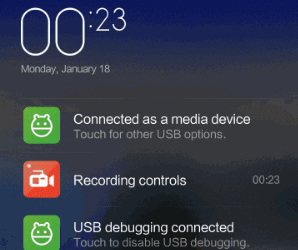Andromeda
Andromeda provides communication among modules for both local and remote service.
Anno:The reason that differentiate local service from remote service is that parameter types in remote service can only be primitive type or custom type that implements Parcelable, while parameter types in local service can be any type such as View and Context.
Features
-
Aidl interface and implemention are the only thing developers need do. bindService() and Service definition are not necessary.
-
Remote service could be fetched synchronously instead of asynchronously
-
Process-priority-hencing work is managed along with Fragment/Activity's lifecycle
-
IPC Callback is supported
-
Event bus for all processes is supported
Anno: service here means interface and it's implementation instead of component Service.
Comparsion between other communication solutions and Andromeda:
| convenience | code invasion | interoperability | IPC | event bus | page router | |
|---|---|---|---|---|---|---|
| Andromeda | good | none | good | Yes | Yes | No |
| DDComponentForAndroid | bad | some | bad | No | No | Yes |
| ARouter | good | some | bad | No | No | Yes |
Download
add classpath in buildscript(set version 1.0.6 as example):
add core lib dependency in Application or library Module:
apply gradle plugin in application Module:
How to use
Dispatcher config
Dispatcher should always in the process that live longest cause it manager all process infos!.
Default process of Dispatcher is main process if not configed.
Considering some process may live longer than main process in some apps(such as music app), developers should
config process name for Dispatcher in this case. Just as follows in build.gradle of application module:
In this case, ":downloader" process is the one that live longest.
init
add init code in Application.onCreate():
Register and use local service
Definition and implementation of local service
There are only two differences between local service and normal interfaces:
- interfaces should be put in a common module to make it accessible to all modules
- Andromeda will only hold one implementation at a time
Register local service
There are two methods to register local service, the first one is as follows:
Another is as follows:
ICheckApple is interface definition. Considering proguard, registering local service with fixed String is not recommanded, just as follows:
How to use local service
Any module that's in the same process with server module could obtain local service after registration. The first method is as follows:
Another is as follows:
Similarly, considering proguard, obtaining local service with fixed String is not recommanded neighter:
LocalServiceDemo shows the details of registration and use of local service。
Callback of local service
Callback of local service is just as normal interface, which is all up to developers.
As a result, Andromeda will not provide any callbacks.
Registeration and use of remote service
Definition and use of remote service
First, define a aidl interface, and expose it to common module along with its Stub and Proxy.
Then provide implementation:
Registration of remote service
Differen from registration of local service, IBinder of remote service is need for registration :
The way as follows is also workable cause BuyAppleImpl extends IBuyApple.Stub, which extends android.os.Binder:
Another way to register is as follows:
Use of remote service
- with() is need before obtain remote service cause Andromeda need to hence server process priority in accordance with Fragment/Activity's lifecycle;
- getRemoteService() will return IBinder. Then you can obtain proxy by XXStub.asInterface(binder);
Set use in a FragmentActivity as example:
Use of remote service in android.app.Fragment,android.support.v4.app.Fragment and normal Activity is similar, demos are CustomFragment,CustomSupportFragment and FragActivity,etc.
Attention:Remote service could be used both in same process and other processes. When use in the same process, it will turned to local interface invoking.
Callback of remote service
Considering time-consuming work may be done in server process, Callback of remote service is necessary.。
For ones that need callback should add IPCCallback parameter in their aidl definitions:
The canonical name of IPCCallback is org.qiyi.video.svg.IPCCallback. Its definition is as follows:
Client can use IPCCallback as follows:
Considering the callback is in binder thread, while most developers want the callback in UI thread, Andromeda provide a BaseCallback for deverlopers.
Use BaseCallback instead of IPCCallback is recommanded!
BananaActivity shows details of how to use it.
Lifecycle control
To enhence server process's priority, Andromeda will do bindService() when Andromeda.with().getRemoteService() in accordance with Fragment/Activity's lifecycle.
As a result, unbind action is need when Fragment/Activity destroyed.
There are 2 cases now:
-
For those who obtain remote service with Fragment/Activity and in main thread, Andromeda will do unbind() action automatically
-
For those who obtain not with Fragment/Activity or in work thread, unbind() action should be invoked by developers:
Subscribe and pushlish event
Event
Definition of Event in Andromeda is as follows:
Obviously, Event consist of name and data, which is Bundle type that can load primitive type parameters or Parcelable type parameters.
Subscribe event
Subscribing event is very simple with one who implements EventListenr such as MainActivity:
This means it subscribes Event whose name is EventConstans.APPLE_EVENT.
Publish event
Publishing event is as simple as follows:
After published, all listeners in any processes could receive the event.
MainActivity shows details of how to subscribe and publish event.

